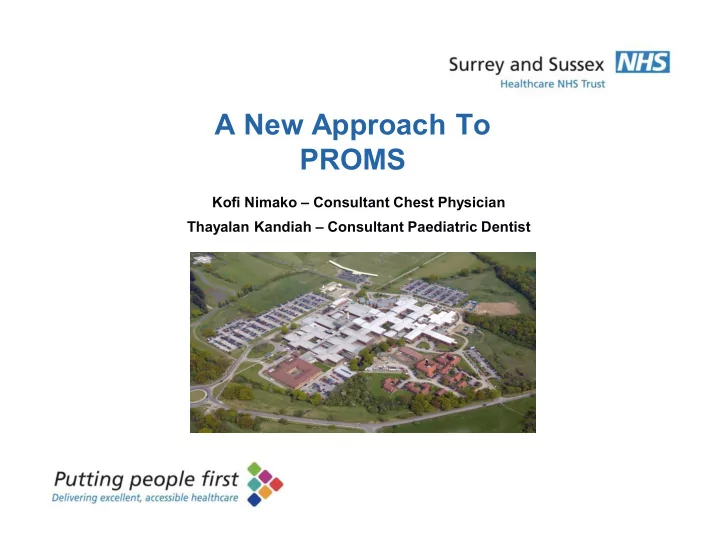

A New Approach To PROMS Kofi Nimako – Consultant Chest Physician Thayalan Kandiah – Consultant Paediatric Dentist
1. What are PROMs? 2. Why consider PROMs? 3. Current use 4. A new approach to PROMs - Challenges - Implementation - Outcome measures
What are PROMs ? • Standardised validated instruments used to measure a patients perception of their: Health - Functional status - HRQoL -
Why consider PROMs ? • Patient centred approach to: - Improving quality of care - Minimising disability - Improving HRQoL • Lord Darzi review • Central part of the quality agenda • Complement other outcome measures
Current use of PROMs England USA/Europe • Driven by government • Driven by clinicians • Used to compare providers • Used to improve patient care • Informed patient choice - Diagnosis • Rewarding performance - Communication - Treatment response - Disease monitoring
Problems with English approach • Challenges of case mix - Severity of conditions - Co-morbidities - Social • PROMs – designed for research and not a comparative tool • No definitive evidence for improvement in quality of care
A New Approach To PROMs - Incorporating into Daily Clinical Practice
Adopt European/US approach • Not a tool for comparing providers/services - Problems with case mix - Optimum timing of PROM questionnaire not known Long term conditions – - multi agency input means difficult to attribute responsibility Emergency admissions – - PROMs only available after the event • Ongoing Pilots will answer these questions for chronic disease
A tool to use locally to deliver better patient care • Barriers - Survey fatigue - Engagement/participation of staff - Patient participation - Emergency admission - Long term conditions - PREM v PROM - Need for rapid data manipulation and processing - Scepticism about the validity and potential utility
Implementation • Utilisation of your care matters – EQ-5D • Retrospective completion (retrospective bias) • Pilot – 3 month - Tilgate and Tandridge - Dental and Maxillofacial out-patient • Review of results at clinical governance meetings - Lead to changes in delivery of care/services
EQ-5D-5L index values before and after treatment: mean values and 95% confidence intervals
Pilot Outcomes • Rates of patient completion • Usability – Patient focus group • Clinician participation – survey of staff • Continuous process - Learning and improvement - Implement changes - Test new services/pilots
Specific PROMs • Encourage use of condition/specific PROMS • Completed by patients prior to being seen in clinic Benefits • Real time feedback • Aligned to routine care • Improved care for individual patient care • Shared decision making • Longitudinal approach Already being used by some • Build on and support existing good practice
Summary • Collection of PROMs data is essential to improve quality of care • PROMs for clinical practice (not performance measurement) • Significant barriers – but can be achieved
Recommend
More recommend